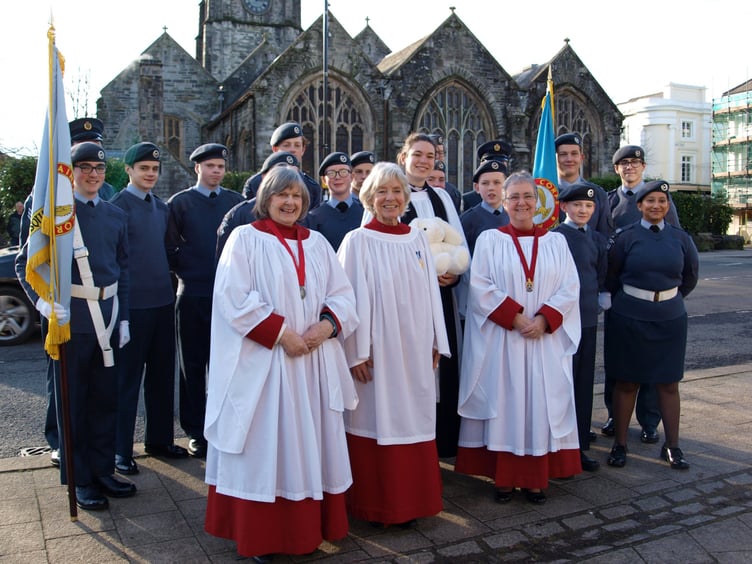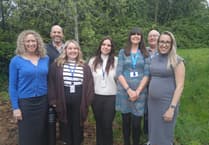CHERISHED memories came flooding back for three choristers at Tavistock Parish Church, when they sang at a special birthday service for some 300 cadets from The Air Training Corps, on Sunday February 5.
During the service the cadets, from the Plymouth and Cornwall Wing and RAF, renewed the Cadet Promise, which choristers Cathy Duke, Rita Bilverstone and Julia Hurle would each have made some years before. Now all retired, they here reflect on their fascinating and very different experiences.
Cathy Duke was invited to be an instructor in the RAF section of the Combined Cadet Force (CCF) shortly after becoming a Spanish and French teacher at Clifton College, Bristol, in January 1993. Her interest in flying was sparked by her father, who had served as a Lancaster Bomber pilot during World War Two, and then flew with British Airways for the rest of his career.
She explained: ‘The RAF section of the CCF was like the ATC, but was run in school. I was to be the essential female teacher so that the RAF girls could go to camp and take part in other exciting activities.
‘To me this sounded really intriguing for several reasons: I had done the Duke of Edinburgh’s award when I was at school and always enjoyed outdoor pursuits and challenges. Of course, I jumped at this amazing opportunity and it was truly rewarding.
‘First, I needed training in order to become a commissioned officer, so had to attend a five-day course at RAF Cranwell as an officer cadet. The course covered the basic skills: drill, turnout, leadership and teamwork, weapon training, navigation etc. It was hard work, but I wouldn’t have missed it for the world.
‘I was now Pilot Officer Duke and still learning the job. Fortunately, the sixth-formers, as NCOs, were well-versed in passing on their knowledge and skills to the new cadets so that they passed their proficiency tests. We all learnt a great deal about aircraft and leadership in these sessions.’
Air Experience Flights were at RAF Colerne, near Bath, where, she said, she clearly remembers the ‘excitement, alarm and emotions’ of young cadets as they took to the air in small two-seater planes, with an experienced pilot teaching the ropes.
‘I had the same wonderful experience so I knew exactly how they felt. They were allowed to take control of the aircraft when the pilot said, “You have control”.’
‘For me, the most memorable part of the first flight was the aerobatics; to loop the loop, do barrel rolls and stall turns, each of which you were invited to attempt on your own! You experienced an adrenaline rush and the G-force pushing against you. Returning to school in the minibus, I remember one cadet thanking me and saying “That was the best day of my life!” It is comments like that which made it all worthwhile.’
Cathy also enjoyed flying on Viking, winch-launched gliders from Hullavington Airfield, a former RAF station in Wiltshire: ‘These were much quieter and calmer flights with just the sound of the wind swishing past. Several lucky cadets were offered basic glider training courses and won their wings. It must have been a real achievement to fly solo in a glider before being old enough to drive a car!’
She stressed that being an RAF cadet was not just about flying. Abseiling, caving and orienteering were among other adventurous pursuits, besides learning navigation, first aid and camping.
‘Summer camps on RAF bases were also full of excitement; maybe building a raft or bridge to cross a river, or night exercises, assault courses or shooting on the range with the opportunity to earn a marksman’s badge.’
She added: ‘The CCF and ATC offer a broad range of opportunities, from treks to adventure activities, and the best possible experience for young people to gain confidence, independence and leadership skills. It also involves learning more about yourself, to fend for yourself and achieve more than you can even imagine.’
A few years later, Cathy took over a flourishing RAF cadet section and in 2002 was promoted to Flight Lieutenant. ‘I was extremely proud to be awarded the Queen’s Golden Jubilee Medal for my service in the CCF and when I retired a year later, received a Certificate of Commendation from the Lord Lieutenant of Bristol for my ten years’ service.’
She has treasured memories of ‘many good times in the CCF’, adding: ‘For me, it was a joy to have worked with such enthusiastic cadets and officers.’
Chorister Rita Bilverstone, the choir’s music librarian, had several family members who served in the Armed Forces, including both grandfathers in World War One, and in World War Two, her parents were in the Navy, two of her uncles in the RAF and another was in the Army.
She explained: ‘My mother and father were “Hostilities Only” ratings, my mother in the Women’s Royal Naval Service and my father in the Royal Naval Volunteer Reserve, so they were “demobbed” after the war. Dad later served a number of years in the Royal Naval Reserve in London, with HMS President moored in the Thames.’
Rita’s brother, Brian, joined the Navy after leaving school, his four and-a-half years’ service including the Falklands War.
‘Having an extra fondness for all things naval, I decided in 1983 to join the Women’s Royal Naval Reserve (WRNR) based at HMS Vivid in Plymouth. I served until April 1992, starting as an Ordinary Wren, and finishing as a Petty Officer Wren, before the WRNS was incorporated into the Royal Navy.
‘I was a Plotter, plotting ships’ positions and courses on navigational charts at the Maritime Headquarters (MHQ) in Mount Wise. As a Leading Wren and Petty Officer, I trained newer recruits in the intricacies of chartwork and the associated activities.’
As Reservists, she explained: ‘We had to attend evening training sessions every Wednesday and alternate Mondays, with two weeks of continuous training each year, also Admiral’s Divisions, to qualify for their annual bounty.
‘We were paid a training allowance for each attendance. Training was very concentrated, as we only had two hours on each evening, and were expected to be as proficient as our full-time naval counterparts when working alongside them during exercises.’
Rita enjoyed the camaraderie and her time with the WRNR, but after her third three-year engagement in April 1992, felt unable to continue her Reserve commitments, especially with the demands of her busy full-time job.
Fortunately, her naval connections were to continue, as four years after joining the WRNR, she accepted a job at Devonport Royal Dockyard, where she worked for 29 years before retiring.
She said: ‘I believe that life with the Services, whether full-time or as a Reservist, is very worthwhile, and helps to develop a person in ways not available to civilians, with learning the value of working together as a team, and the responsibilities of leadership in a military situation, being major parts of that.’
Tavistock Parish Church’s longest serving chorister, Julia Hurle, met her husband, Ray, through the ATC, when, as teenagers, both were cadets in the 2152 Squadron Bristol North.
‘I only joined because my friend told me there were some nice young men, but little did I know I was to meet my husband and I was only 15 then,’ she explained.
The couple, married 64 years ago, moved to the Tavistock area some 45 years ago and like Julia, Ray is a member of St Eustachius’ congregation.
Among Julia’s fondest memories of the ATC is flying. ‘Before going up, we went into a simulator, which was tremendous fun,’ she explained, ‘but when we went up in a Tiger-Moth the trainers didn’t tell me I was going to do it. I was put at the controls for ten minutes and the joystick was very sensitive. When I pushed it up the plane suddenly shot upwards!’
But, like Cathy and Rita, Julia wouldn’t have missed her experiences in the cadets for the world!





Comments
This article has no comments yet. Be the first to leave a comment.